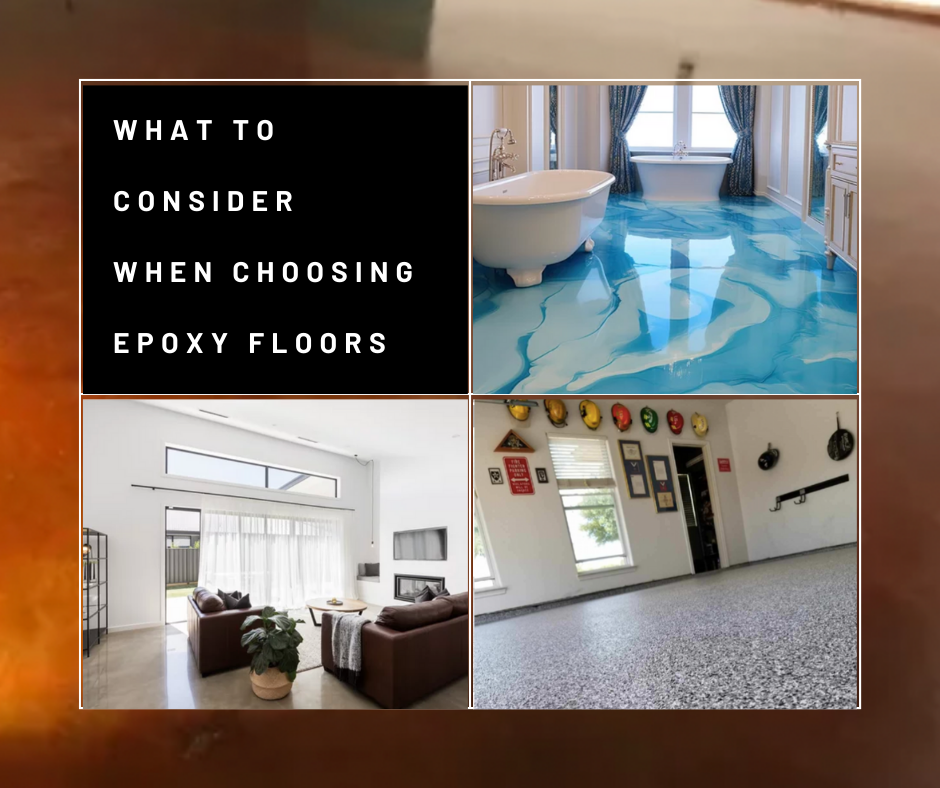Epoxy flooring is a popular choice for both homes and businesses due to its
durability, versatility, and aesthetic appeal.
However, before deciding to use epoxy flooring, there are several important factors to consider.
- Determine Your Needs: Understand the purpose of the flooring and the environment it will be installed. Consider factors such as the type of facility (industrial, commercial, residential, etc.), the level of foot and vehicle traffic, chemical exposure, temperature fluctuations, and any specific industry regulations or standards that need to be met.
- Durability and Resistance: Different epoxy flooring formulations offer varying levels of durability and resistance to chemicals, abrasion, impact, and other factors. Evaluate the potential hazards the floor might encounter and choose a system that provides adequate protection.
- Traffic and Usage: Evaluate the level of foot traffic and potential wear and tear the floor will experience. Epoxy flooring is highly durable and suitable for heavy traffic areas, making it an excellent choice for commercial spaces. However, for residential use, consider whether the flooring can withstand the specific demands of your household or business.
- Surface Preparation: Proper surface preparation is crucial for the success of an epoxy floor. The substrate must be clean, smooth, and free from any contaminants, such as oil, grease, or moisture. This may involve floor grinding, shot blasting, or other methods, depending on the existing surface condition.
- Thickness and Buildup: Epoxy floors come in different thicknesses, and thicker coatings typically offer better durability. Consider the thickness needed based on the application and the condition of the existing substrate.
- Application Environment: Epoxy flooring should be applied under controlled conditions, with appropriate temperature and humidity levels. Extreme temperatures or high humidity can affect the curing process and may lead to a subpar finish.
- Floor Type: Epoxy can be applied to various floor types, including concrete, wood, and tiles. Ensure that the epoxy is suitable for the specific floor type you have, as different types of epoxy formulations are designed for different substrates.
- Design and Aesthetics: Epoxy flooring comes in a wide range of colors, patterns, and finishes. Consider the overall design and aesthetic requirements of your space and choose an epoxy system that complements the interior decor and brand image.
- UV Stability: If the epoxy floor will be exposed to sunlight, make sure to select a UV-stable epoxy that won’t yellow or degrade when exposed to UV radiation.
- Budget: Different epoxy flooring systems have varying costs. While it’s essential to stay within your budget, compromising on quality may lead to higher costs in the long run due to repairs and replacements.
- Chemical Resistance: Epoxy floors are known for their chemical resistance, which is especially important for industrial or commercial settings where spills and chemical exposure may occur. For home use, consider whether this feature is necessary for your specific needs.
- Slip Resistance: Depending on the setting, slip resistance might
be crucial for safety. For areas prone to spills or moisture, consider
adding slip-resistant additives or selecting textured epoxy options. - Ease of Maintenance: Epoxy flooring is relatively low-maintenance, but it still requires regular cleaning and care to preserve its appearance and performance. Understand the maintenance requirements and whether they align with your
lifestyle or business operations. - Installation Time and Downtime: Consider the time available for installation and how long the space will be out of commission during the installation process.
- Cost: Epoxy flooring can be cost-effective in the long run due to its durability and longevity. However, the initial installation cost may be higher than other flooring options. Evaluate your budget and the value the epoxy floor will provide over time.
- Certifications and Compliance: If installing for your business, depending on your industry, there might be specific certifications or regulations that the epoxy flooring needs to meet. Ensure the chosen system complies with relevant standards.
- Professional Guidance: It’s essential to consult with experienced epoxy flooring contractors or specialists such as Mr. Epoxy Flooring Solutions who can assess your needs and recommend the most suitable flooring type for your specific application.
- Warranty and Professional Installation: Inquire about warranty coverage for the materials and workmanship.
By carefully considering these factors, you can make an informed decision about whether epoxy flooring is the right choice for your home or business.
The professionals at Mr. Epoxy Flooring Solutions can provide valuable insight and guidance, making your decision a sound one.
Contact us via phone/text 346-317-4599 or via email at
sales@mrepoxygarageflooring.com – we offer free, no-obligation estimates and have a wide variety of affordable flooring choices for residential, commercial, industrial, or institutional applications.
Epoxy floors are a true value-added investment in your home or business – hygienic – antimicrobial – chemical resistant – fast cure – hard wearing – slip resistant – UV stable – low VOC – 30-year warranty.
We offer solid color, broadcast flake, micro-stone, metallic and reflective
artistic floor resins, concrete polishing and staining as well as power washing
and sealing.
